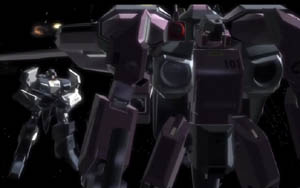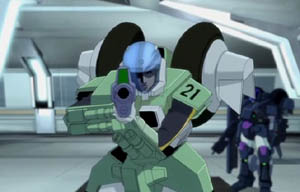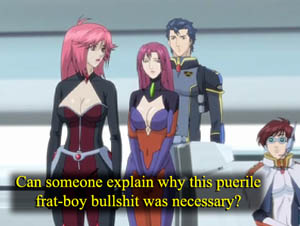|
Way back in 1985, the animated import Robotech, a hybird series composed of three disparate Japanese SF shows, introduced some smart sci-fi drama to American after-school programming and in large part helped to kick off the anime boom of the '90s, which still limps along today despite the fact that most anime has sucked rocks for countless years at this point. The original series had ended with something of a cliffhanger, or at least an ending not fully resolved, which hinted at future adventures to come. What actually happened? There was a Robotech movie cut together from an unrelated straight-to-video feature and some series stock footage, which bombed and which didn't resolve the end of the original show, i.e. what had happened to Rick Hunter. There was a failed attempt at a sequel series, which resulted in no more than three (unaired) episodes, and which didn't address what had happened to Rick Hunter. Over a decade later, there was a pilot floated for a different sequel which was set a millennium in the future and which, of course, didn't have a bloody thing to do with Rick Hunter. The series was never produced. And then, in 2006, series distributor Harmony Gold USA finally succeeded in getting an original animated feature created and seen through to completion, which picked up right where the series left off and featured...a cameo by Rick Hunter, whose fate is still unresolved by the end. Longtime Robotech fans might've started wanting to use these people's heads as footballs around this time. 
But nevertheless, after seemingly unending failures, an animated continuation was indeed finally produced, decades after most everyone had stopped giving any semblance of a damn. How, then, does it fare? Curious about it that I was, I cannot be dishonest about the end result. The film is something of a muddled mess. A plot, generally seen as a prerequisite in these sorts of things, seems largely in absentia. Some things happen, and then some other things happen, often feeling quite random, and eventually it's over, and nothing new has really been brought to the table. There's some explosions and some shouting, a tragic death with no resonance and an important life lesson learned in the most obvious possible fashion. But what actually happens? How much time do you have? The preceding comment is not meant to indicate that the story is steeped in plot, which, as I've already indicated, is not the case. It is, rather, steeped in its own history. The three-part Robotech series ran for eighty-five episodes. There was also the aborted sequel, which had eventually seen the light as a series of novels and a comic adaptation that also was never finished. The film throws you right into this without much real concern that you're going to be lost, no matter who you are. Anyone experiencing Robotech for the first time with this feature will have no hope of parsing its events. Even long-time fans will be at a loss for much of the running time. It begins by reiterating the final battle seen in the series, but from the point of view of the returning deep-space Expeditionary Force, rather than that of the ground forces, which is a neat enough idea and which is the best part of the film. It then contradicts several points from the original finale, including the fact that it ended with Earth's fleet being destroyed by the departing alien invaders. The fleet here remains alive and well. Other choices lead to more head-scratching. The character of Louie Nichols is seen as being amongst the soldiers returning from the deep-space mission, though when we last saw him in the series, he was still on Earth. How did he end up with the fleet, and why is he alone? What about the rest of his squad? We aren't told. His knowledge is confusingly selective. He encounters a damaged android named Janice; he knows of her, yet has seemingly never heard of the alien race that helped create her. The race in question, the Haydonites, along with Janice, are both holdovers from the aborted Sentinels sequel, though their origins and roles in the story have been changed. So not only does The Shadow Chronicles expect its audience to know about these plot elements that only ever appeared in print-only spin-offs, it also expects you to forget what you knew about them before. Worse, it expects you to care. Here's a challenge for any fan editors out there: cut out every scene with Janice, and see if it affects anything at all. 
The Haydonites fare little better. They're evil. Why? Who cares. They have single eyes modeled after 2001's HAL 9000 computer, and end their first scene by veritably quoting the Emperor from Return of the Jedi, so we can have no doubts about their roles as antagonists. Everything else is oblique. Who are they? We hear that they were a race with whom the Earth fleet became allies in the course of their mission. Apparently unconcerned about adding yet another player to an already overcrowded board, the writers have decided that these guys are actually the ones who set off the whole war which has already involved three alien races. Their motivation is simply that they want to destroy any race who uses Protoculture, Robotech's mystical energy source. Why? Are they concerned about possible military rivalry? Is it a supply issue? Do you think the film bothers to say? The Haydonites are the worst kind of cinematic villains: ones with no real purpose unto themselves, who exist in the story solely as an excuse for things to explode. The actual production values aren't bad, all things considered. The animation is more modern in style, though that doesn't actually mean that it's any more fluid. All of the spacecraft are CGI creations, which clash somewhat with the hand-drawn characters. It's not bad for what it is, but fails to impress me for the simple reason that I could do it myself, whereas good hand-drawn animation takes far greater talent than most of us will ever possess. The actual scripting is where the brunt of the blame must fall. Being a ground-up production and not an adaptation, there was no original script to work from, meaning all of the writing was up to the folks at Harmony Gold, with regrettable results. True to their style, nearly every character is a smart-aleck, without ever being genuinely funny. Early dialogue is laden with awkward exposition, despite which the film is chock-full of unexplained circumstances. Nonsense seeps in like mold in a damp apartment-what are we to make of it when the Invid queen displays some Earth fighter craft on a video screen and indicates, "See those planes? They're invisible to us." How did this get past the editorial stage, if there was one? An Earth officer worries a particular tactic will "decimate half the planet." So, that's a twentieth of the planet gone, then. Still pretty bad, but I doubt it's what they meant to say. Line readings are often more wooden than a beaver dam, with enunciation valued over emotion. The ostensible hero is persistently accompanied by music intended to indicate that he is a complete doofus. And every female character sports a D-cup and often is attired in absurdly low-cut tops more suited to a Barbarella remake, in a case of immensely tacky fan pandering. 
The Shadow Chronicles is an obvious attempt to launch a new franchise. In the five years since it was released, this hasn't come to pass. Does it really deserve to? It's comprised almost entirely of the worst aspects of Robotech: a confusing mythology, weak performances, and repeated references to awful Minmei songs I suspect every Robotech fan would rather forget. The best parts of the series-well drawn characters, strong SF ideas, and thoughtful ruminations on the dehumanizing effects of conflict-are lacking, replaced by U-turn epiphanies of the "I hate all aliens! Oh shit, an alien saved my life!" variety and endless shots of girls' butts filling half the screen. It's been over a quarter-century since Scott Bernard flew off into space in search of Admiral Rick Hunter. The perpetuators of the Robotech mythos have had the same amount of time within which to come up with a single good sequel idea, and so far have had about as much luck. -review by Matt Murray
|
|
||||||||